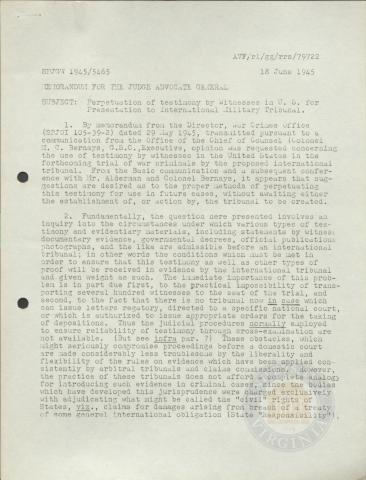
Page 1
| Parent | Perpetuation of testimony by Witnesses in U. S. for Presentation to International Military Tribunal |
|---|---|
| Date | 18 June 1945 |
| Language | English |
| Collection | Tavenner Papers & IMTFE Official Records |
| Box | Box 1 |
| Folder | General Reports and Memoranda from January 1946 |
| Repository | University of Virginia Law Library |
AVF/rl/gg/rrs/79722
SPJGW 1945/546518 June 1945
MEMORANDUM FOR THE JUDGE ADVOCATE GENERAL
SUBJECT: Perpetuation of testimony by Witnesses in U. S. for Presentation to International Military Tribunal.
1.By memorandum from the Director, War Crimes Office (SPJOI 105-39-2) dated 29 May 1945, transmitted pursuant to a communication from the Office of the Chief of Counsel (Colonel M. C. Bernays, G.S. C., Executive, opinion was requested concerning the use of testimony by witnesses in the United States in the forthcoming trial of war criminals by the proposed international tribunal. From the Basic communication and a subsequent confer¬ence with Mr. Alderman and Colonel Bernays, it appears that sug¬gestions are desired as to the proper methods of perpetuating this testimony for use in future cases, without awaiting either the establishment of, or action by, the tribunal to be created.
2.Fundamentally, the question here presented involves an inquiry into the circumstances under which various types of tes¬timony and evidentiary materials, including statements by witness documentary evidence, governmental decrees, official publications, photographs, and the like are admissible before an international tribunal; in other words the conditions which must be met in order to ensure that this testimony as well as other types of proof will be received in evidence by the international tribunal and given weight as such. The immediate importance of this prob¬lem is in part due first, to the practical impossibility of trans¬porting several hundred witnesses to the seat of the trial, and second, to the fact that there is no tribunal now in case which can issue letters regatory, directed to a specific national court, or which is authorized to issue appropriate orders for the taking of depositions. Thus the judicial procedures normally employed to ensure reliability of testimony through cross-examination are not available. (But see infra par. 7) These obstacles, which might seriously compromise proceedings before a domestic court are made considerably less troublesome by the liberality and flexibility of the rules on evidence which have been applied con¬sistently by arbitral tribunals and claims commissions. However, the practice of these tribunals does not afford a complete analogy for introducing such evidence in criminal cases, since the bodies which have developed this jurisprudence were charged exclusively with adjudicating what might be called the "civil" rights of States, viz., claims for damages arising from breach of a treaty of some general international obligation (State "Responsibility"),
